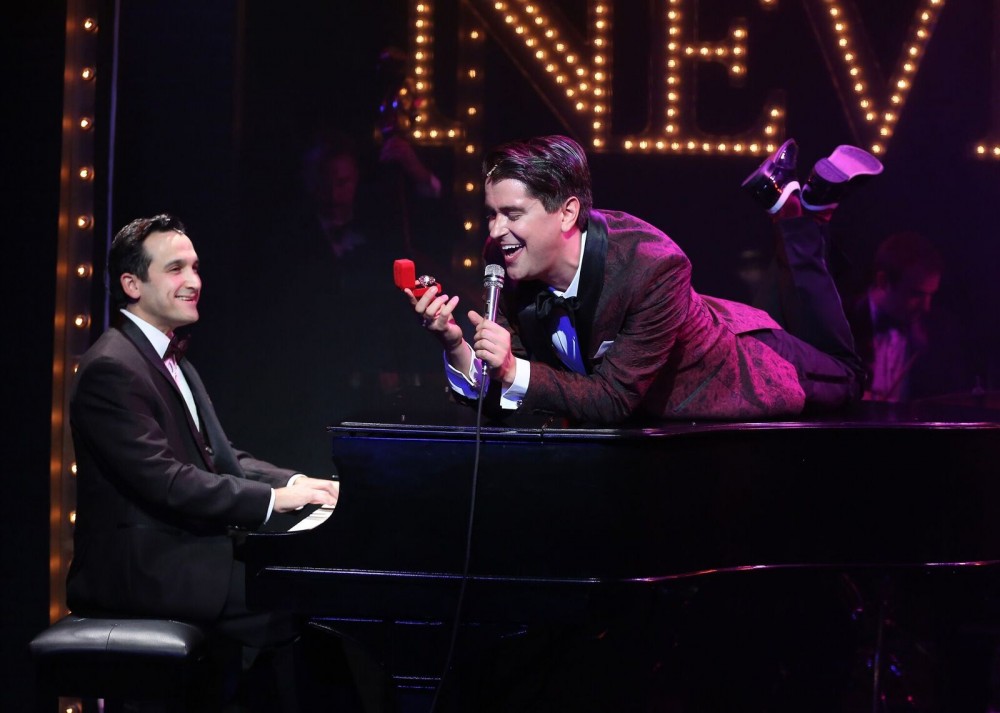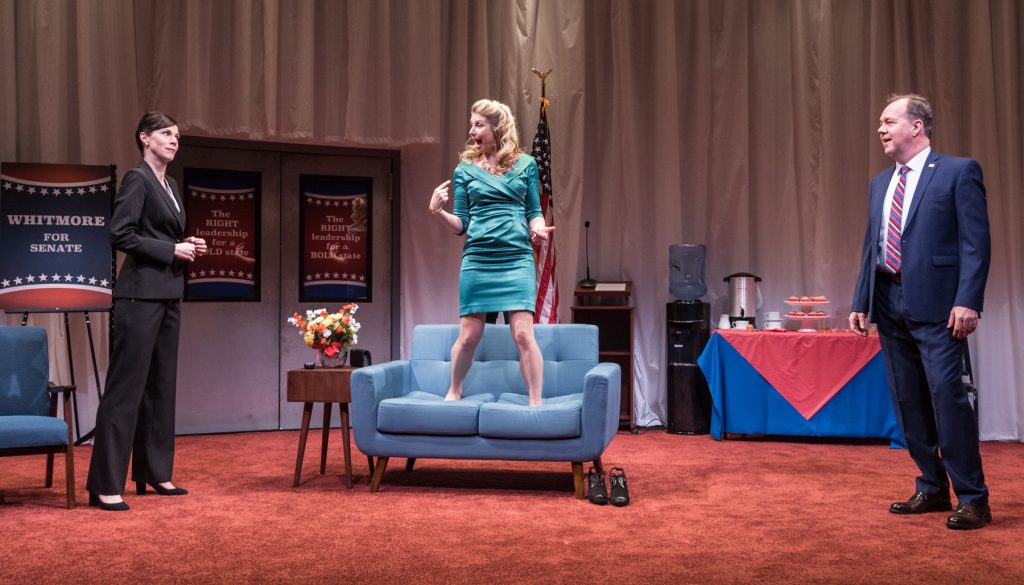A TANTALIZING REJUVENITION OF ‘60’S GAY RAPTURE … OR NOT
By Myra Chanin
Mark Sonnenblick, the young triple threat who created the absorbing book, music and lyrics for Midnight at the Never Get – and his backup crew – have either the most chutzpah or the largest cojones in the Big Apple. Maybe both. Sonnenblick is the intrepid, confident and fearless words and music guy, gutsy enough to expose the ears of audiences who’ve come to the York Theater to see his new Off-Broadway musical, to the best 20th Century vocalists warbling the best 20th Century showtunes from an exquisitely curated juke box before they hear Sonnenblick’s own melodic score. A rare bird in today’s musical theater, Sonnenblick is a genuine tunesmith whose danceable rhythms urge your legs to stand up and fox trot and your lips to hum along. His lyrics may still lack the clever rhymes of a Larry Hart, Ira Gershwin or yes, a Cole Porter, but some of his lines are already quite striking for a 28-year-old artist.
Compare this Sonnenblick verse:
Should have cared a little less,
Should have shown up, should’ve shared a little less,
Maybe then, when my only rose turned out to be a ruse,
I would have a little less to lose
to an early Porter example:
Bulldog! Bulldog! Bow, wow, wow. Eli Yale
Bulldog! Bulldog! Bow, wow, wow. Our team can never fail!
We can only hope Sonnenblick’s rhymes have as much staying power as Porter’s. FYI, Sonnenblick is a Larson Grant winner, a Kleban Prize finalist and a MAC Award nominee. Since it’s better to hear for yourself than hear about music, a sneak preview of three of the 13 swinging songs from the show awaits you at https://yorktheatre.org/on-stage/mainstage-series/midnight-never-get.
Midnight at the Never Get is a memory play with all its ensuring virtues and vices. The leading man, Trevor Copeland, is played by Sam Bolen, who in real life pitched his idea for the play to Sonnenblick in Mark’s kitchen. The Never Get was an after-hours illegal gay club where every Friday night at midnight, Trevor Copeland performed the songs his lover, composer Arthur Breitman, wrote for him during that week. The time period is the late ‘60’s when rock and roll appeared to displace the Great American Songbook as the music of the period, but not in the Gay club world that Copeland inherits. There Ella, Dinah, Judy, etc. reign supreme.
Christopher and Justin Swader’s set is simple but sophisticated and elegantly swanky. A light-bulbed “The Never Get” sign and an initially unmanned baby grand piano on stage right are framed by three receding rectangular light-bulbed arches. It’s how Don’t Tell Mama could have looked in the hands of the top design artist.
Copeland is the more passionate lover. His reticent half, The Pianist (Jeremy Cohen) speaks the lines once spoken by the invisible-except-in-Copeland’s-memory Arthur Breitman. Copeland’s narration connects their personal romantic and musical collaboration with the gay protests of the time. It’s one man’s vision. One more thing. Copeland, who’s been dead for a while, is waiting in the hereafter to reunite with the just deceased Breitman. Copeland has an unusual view of death. He describes it as an eternal point in which memory sets a stage a deceased can fill with people and events with whom he/she wants to spend eternity.
Copeland also recalls their impossible love, as “the kind that’s irrational. Or unrequited. Or already married,” but believes “love is a gift and love is precious and, if you’re lucky enough to feel it deeply, don’t crush it. Embrace it.” but there are constant hints that Breitman may not be in the same pew as Copeland remembers. Breitman may have been extremely ambitious and found broader vistas, changed his parameters, made connections with producers in New York and Hollywood which he couldn’t … or didn’t … or didn’t want to share with Copeland.
There are intriguing twists along the way to the denouement that have been hinted at and should not come as a complete surprise, but are a partial surprise when reality conquers nostalgia.
Sam Bolen and Jeremy Cohen, the two principals, capture and hold your attention, imagination and your interest. The tension between them is palpable.
The director, Max Friedman, is a very interesting fellow. Only 28 years old, he’s a Summa Cum Laude graduate of the Sidney Myer School of Theatrical Preparation — first handing out prix fixe menus outside the Don’t Tell Mama dining room before being upgraded to the Brick Room bar service where his dedication to service made an impression on the right people and resulted in getting him two paying semi-simultaneous theatrical credits. He’s also the Assistant Director on Joe Iconis’s hot and heading toward Broadway Be More Chill . His fluid direction of Sonnenblick’s two-character history keeps your attention glued to the stage, where it should be.
York Theatre Company through November 4, 2018,
619 Lexington Avenue, entrance on 54th Street,
Box Office 212-935-5820
Yorktheatrecompany@yorktheatre.org

























